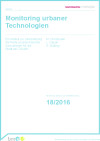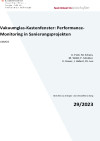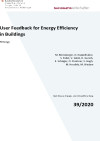Suchergebnisse für "Factsheet%3A Energietechnologien gestalten%2C die f%C3%BCr alle sinnvoll und nutzbar sind"
ThinkHome: Gesteigerte Energieeffizienz durch den Einsatz von künstlicher Intelligenz im Haus der Zukunft
ThinkHome ist ein vernetztes, autonom gesteuertes Haus der Zukunft, das der Optimierung der Energieeffizienz und der Verbesserung des Nutzerkomforts dient. Das intelligente Zusammenspiel aller Haustechnikkomponenten ist hierbei von höchster Bedeutung. Zu den Projektinhalten zählten eine umfassende Wissenspräsentation aller in einem Gebäude vorkommenden Daten, der Einsatz von Methoden der künstlichen Intelligenz, maschinelles Lernen sowie agentenbasiertes Software Engineering.
Sustainable energy supply for Austria
Rapidly increasing energy consumption and decreasing resources of fossil fuels lead to dramatical economical, ecological and social problems.This study identified the feasible long term potential of renewable energy sources. Then ways were developed how to supply the demand for future energy consumption with renewable energy sources, despite increasing energy services.
FEELings - User Feedback for Energy Efficiency in Buildings
Der Energieverbrauch von Gebäuden wird maßgeblich durch das Verhalten von NutzerInnen beeinflusst. In diesem Forschungsprojekt wird ein neuartiges User-Feedbacksystem untersucht. NutzerInnen geben Feedback zur empfundenen Raumqualität. Auf Basis des Feedbacks werden Einstellungen an der Gebäudetechnik zur Energieeffizienz- und Komfortsteigerung optimiert. Der Proof-of-Concept für dieses neuartige System wird anhand von zwei Use-Cases erbracht.
Energy Efficiency and Risk Management in Public Buildings (EnRiMa)
Das zentrale Ziel des EU Forschungsprojektes EnRiMa war es, ein internetbasierendes Entscheidungsfindungsprogramm (Decision Support System - DSS) zu entwickeln, das Betreiber von öffentlichen Gebäuden in der Effizienzsteigerung und CO2 Emissionsreduktion unterstützt. Das DSS wurde mit existierenden Gebäudeleitsystemen, wie DESIGOTM verknüpft und es wurden zwei österreichisches Testgebäude mit dem DSS analysiert. Ebenso wurde ein weiteres Testgebäude in Spanien untersucht.
Monitoring urbaner Technologien

Ein Modell zur Abschätzung der Reife soziotechnischer Innovationen für die Stadt der Zukunft
Schriftenreihe
18/2016
M. Ornetzeder, L. Capari, A. Gutting
Herausgeber: BMVIT
Deutsch, 96 Seiten
Downloads zur Publikation
Kierling passive house - heading into the future sustainably
Using the example of demonstrational renovation, Kierling (built between 1977 and 1979) tests the possibilities of a renovation in passive house standard in technical, organizational and financial terms as an outstanding example of a comprehensive renovation.
Vakuumglas-Kastenfenster: Performance-Monitoring in Sanierungsprojekten (VAMOS)

Fortsetzung und Vertiefung der Sondierung VIG_SYS_RENO zum Einsatz von Vakuumglas in Kastenfenstern für Zwecke der energetischen Optimierung von solchen Konstruktionen für Sanierungszwecke / Bestandsertüchtigung; Als Ergebnis werden vertiefte Kenntnisse über den Einsatz von hochwärmedämmenden Vakuumgläsern via Simulation und Einbau/Monitoring in Realsituation erarbeitet.
Schriftenreihe
29/2023
U. Pont, M. Schuss, M. Wölzl, P. Schober, K. Hauer, J. Haberl, Ch. Lux
Herausgeber: BMK
Deutsch, 147 Seiten
Downloads zur Publikation
Gründerzeit mit Zukunft - Demonstrationsprojekt 1: David´s Corner
Energetisch hochwertige Sanierung von drei benachbarten gründerzeitlichen Wohnhäusern in ertragsschwacher Lage.
Urban consolidation Lehen - Subproject 3: Demonstration project - intelligent e-monitoring
The aim of the project was the implementation of an innovative energy consumption monitoring concept with the active integration of the residents and a study of the resulting effects on the energy consumption behaviour.
FEELings - User Feedback for Energy Efficiency in Buildings

Der Energieverbrauch von Gebäuden wird maßgeblich durch das Verhalten von NutzerInnen beeinflusst. In diesem Forschungsprojekt wird ein neuartiges User-Feedbacksystem untersucht. NutzerInnen geben Feedback zur empfundenen Raumqualität. Auf Basis des Feedbacks werden Einstellungen an der Gebäudetechnik zur Energieeffizienz- und Komfortsteigerung optimiert. Der Proof-of-Concept für dieses neuartige System wird anhand von zwei Use-Cases erbracht.
Schriftenreihe
39/2020
M. Monsberger, D. Koppelhuber, S. Pabst, V. Sabol, H. Gursch, E. Schlager, O. Prentner, S. Singh, M. Herzlieb, M. Wedam
Herausgeber: BMK
Deutsch, 80 Seiten
Downloads zur Publikation
50 green houses - Development and demonstration of a low-tech façade greening system
Development of a cost-efficient all-in façade greening system („Greening-Toolkit“) including a maintenance concept, involving all trades and processes, for a broad (facing roads) implementation on facades in the urban built environment, combined with a process innovation for simplification of all necessary coordination processes.
greening UP! Sustainable green maintenance, maintenance, maintenance of vertical greenery including legal aspects
Based on extensive surveys and analyses of existing vertical building greenery in outdoor areas (floor and system-bound façade greening) and vertical interior greenery, the project developed tailor-made green care, maintenance and repair concepts and addresses legal aspects. The "greening UP!" Knowledge pool with concrete recommendations and clearly presented findings as well as the conception of a digital tool for the "First Green Aid" complete the project.
Energy Efficiency and Risk Management in Public Buildings (EnRiMa)
The major objective of the project EnRiMa was to develop an internet based decision-support system (DSS) to enable operators of public buildings to increase the system efficiency as well as to reduce the CO2 emissions. The DSS can be linked to existing energy management systems as DESIGOTM. The University of Applied Science Burgenland, Campus Pinkafeld, and ENERGYbase, Vienna, have been used to test and calibrate the EnRiMa DSS.
Demonstration building of the eco²building system: First passive house prefabricated wood building system for commercial and industrial buildings
The EU funded "eco2building" construction system in a timber-frame based modular design represents a systematic approach for energy efficient commercial and industrial buildings. The object of the eco²building demonstration project - the logistics centre in passive-house quality for "Eine Welt Handel AG" - in Niklasdorf was to optimize the planning and construction processes and prepare for the market launch of the eco²building construction system. Accompanying research monitored and disseminated the experience.
SmallWindPower@Home - Impact assessment of building-mounted small wind turbines on performance, people, building and environment
Within the project SmallWindPower@Home the impact of complex obstacles on the local flow pattern as well as on the inflow and the performance of different building-mounted small wind turbines (SWT) had been evaluated. Furthermore the effects of these building-mounted SWT on the building, the resident people and the direct environment were analysed.
BIGMODERN - Subproject 9: Demonstration project University Innsbruck, Faculty for Construction Engineering - Implementation
The demonstration project University Innsbruck, building of the faculty for construction engineering is part of the flagship project BIGMODERN. The demonstration project shows that in major renovation projects high energy and sustainability performance can be achieved using economically viable solutions.
ECR Energy City Graz - subproject 3: +ERS - Plus Energy Network Reininghaus Süd
The multifunctional neighbourhood "+ERS - Plus Energy Network Reininghaus Süd" was realized within the urban planning area of Graz-Reininghaus. The project aims to optimize the energy concept of the single buildings as well as of the building cluster in order to achieve a plus-energy standard within the residential neighbourhood.
smartEXT - extended application boundaries for proven passive house technology
The present study aims to explore the application options for compact units (ventilation devices including micro heat pumps, developed for passive houses) in low energy buildings. Compact ventilation units for heat recovery, heating and domestic hot water shall bear the basic heating load, whereas peak loads shall be covered by newly-developed auxiliary heating equipment combined with intelligent control algorithms. This allows increased energy efficiency as well as cost effectiveness together with higher living quality and lower ecological load.
EDEN - Developement of a structured data and preparation documentation with a minimized error-proneness for energy performance cerificates.
Current energy performance certificates hold major flaws. Therefore, the presented research initiative aimed at the development of a standardized and easy-to-use, generic Input-Data-Documentation, which ensures the quality of energy certificates for all involved stakeholders. During the development, the documentation had been conducted and for a chosen sample of representative buildings, which is expected to demonstrate the high potential of such a development.
BIGMODERN Subproject 7: Monitoring concept
Development of a pattern for comprehensive documentation of the project results. The concepts contain amongst others monitoring of energy consumption, resources, costs, functionality and comfort, etc.
